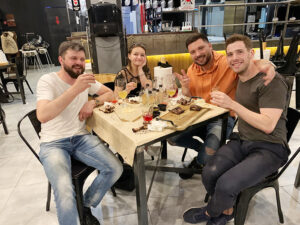Editor’s note: Max Frost, son of Chronicle owners Mark Frost and Sandra Hutchinson and brother of The Chronicle’s Zander Frost, is President and Chief Operating Officer of RocaNews.com, a media start-up in New York City. Tuesday, RocaNews published the following article.
It began: Last July, RocaNews sent its co-founder & editor Max Frost to explore Ukraine and meet the people impacted by the war that has been simmering there since 2014. Here are some of his thoughts.
By Max Frost
Special to The Chronicle, rocanews.com

There are countless ways to explain the war that may be about to break out in Ukraine. When it comes down to it, though, it’s power politics: If Russia invades, it is because Vladimir Putin has decided it is in his, or Russia’s, interest to do so. Ukraine and its allies — mainly the U.S. and the NATO alliance it leads – have been unwilling or unable to stop it.
That’s international relations theory.
What’s not theory, though, are the lives of the 40M+ Ukrainians whose lives hang in the balance, dozens of whom I met traveling in the country last summer.
In the small western Ukrainian city of Chernivtsi, I met Oleg, a barber, DJ, and Ukrainian breakdancing champion. After cutting my hair, he invited me to watch that night’s Euro Cup football match with him and his friends Anya, a student, and Sasha, a barber.
We ate ribs, drank a sickening amount of vodka, smoked a pack of cigarettes, and joked about when everyone would get married.
Nearby, I hitched a ride with Mikhael, a Ukrainian soldier, who was traveling to visit his girlfriend. Americans had come to Ukraine to train Mikhael’s unit — their discipline wowed him and they became good friends.
Mikhael’s dream was to come to America. If he couldn’t do that, he wanted to marry his girlfriend, a teacher, and get out of the army. “People die every day,” he told me. And the money wasn’t good enough.
In Kharkiv, a city in northeastern Ukraine near the border with Russia, I met Sasha, Marie and Volodya. Sasha was a Russian journalist who moved to Ukraine to work in tech because independent journalism had become too difficult in Russia. Marie and Volodya had just moved to Kharkiv because Volodya took a job there. Marie taught English remotely, so she could be anywhere.
They’re about 50 miles from the Russian border; the tanks wait nearby.
My friend Alex lives in Kyiv, the Ukrainian capital. We talked about the future of Ukraine and its relationship with Russia. “You can’t understand someone like Vladimir Putin,” he said. “He lives in a different world. He believes in power – that’s it. He’s not like us.”
In Mariupol, 10 miles from the frontline of Ukraine’s war with Russia-armed separatists, I met Andrew and Natalya, both in the Ukrainian army.
Andrew loved Ukraine — he kept disarmed landmines on his bookshelf as a reminder of his recent experiences on the frontline in Ukraine’s war against the separatists. Natalya, an army nurse, was a proud ethnic Russian who disagreed with Andrew on everything political. Yet they lived together and loved each other.
There’s no telling what will happen to these people’s lives if war breaks out. But they’re not worried:
“Is Russia going to invade ukraine??” I wrote to Alex in Kyiv.
“Hah, no [crying laughing emoji],” he responded. “Russia doesn’t do conventional wars because she loses every one of them [crying laughing emoji]…It will be Chechnya for them multiplied by 30.”
Mikhael, a soldier, DM’d me on Instagram last week to tell me that he’s hoping to leave the army. Not because of the risk of war — but because “my salary doesn’t satisfy me 🙁 ”
He shrugged off the risk of war: “We having war against Russia for 8 years,” he wrote.
Oleg and his friends at the barbershop have not stopped posting pictures of haircuts.
Andrew, another soldier whose city and army unit will almost certainly be in the firing line if war breaks out, wrote to me: “I think Russia is bluffing. I believe that we should always think positively. There are a lot of bad things in life, and if you constantly think about it, you can go crazy.”
So is Ukraine about to find itself at the center of Europe’s largest war since the 1940s? My friends there make me optimistic the answer is “no.”
Copyright © 2022 Lone Oak Publishing Co., Inc. All Rights Reserved
 Glens Falls Chronicle Serving the Glens Falls/Lake George region; Warren, Washington and northern Saratoga counties since 1980
Glens Falls Chronicle Serving the Glens Falls/Lake George region; Warren, Washington and northern Saratoga counties since 1980

